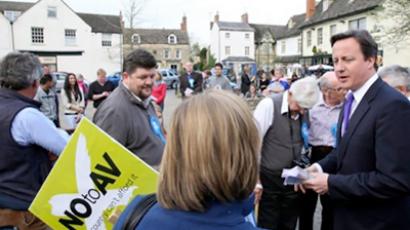A million-strong task: Scots push for UK breakup
Supporters of Scottish independence have launched their bid for a declaration that could see the nation break free from a 305-year-old union with the United Kingdom.
The Scottish National Party believes if a million people put pen to paper, it will secure victory in a referendum they want held in 2014,for the country to become fully independent by 2016.
The ‘Yes Scotland” campaign now has two and a half years to win over the majority of Scots.
The independence drive is being led by Alex Salmond, Scottish first minister and the leader of the Scottish National Party (SNP). His party won a surprise majority in Scottish elections last year with the main election promise to hold a referendum on Scotland’s independence.
Under a devolved system of government, the Scottish parliament created in 1999 controls domestic health, education and prisons while the British government in London controls everything else including foreign policy and defense.
“If the parliament can run education, then why can’t it run the economy? If it can be trusted to run the health service, then why can’t it represent Scotland internationally? If it can be trusted to protect our old people, then why can’t we protect the country, and do so without the obscenity of nuclear weapons?” Salmond said at the launch.
Alex Salmond was the first to sign the “Yes declaration” – a pledge to make Scotland a "greener, fairer and more prosperous" independent nation.
As the Scottish National Party member of the European Parliament Alyn Smith explained to RT, the campaignis not about ending anything, but rather about starting a new relationship as Scotland with the rest of the world, joining the mainstream of the world.
Opinion polls show that around 40 percent of Scottish people are sympathetic to independence, with around 10 percent undecided and the remaining 50 percent opposed. But Alyn Smith believes they have two years to win the people over for an independent Scotland without the current artificial restraint they are under.
“We have a considerably rich asset base in terms of natural resources, human resources, we’ve got water, we’ve got the ability to feed ourselves,” he told RT.
There has always been a compelling emotional argument for Scottish independence – a perception that the British parliament in London does not nurture Scotland's national interests.
“You need to be represented by a government that actually does represent you. Presently the London government simply just does not do that and it is very-very clear to the people of Scotland,” Alyn Smith explained to RT.
The argument only intensifies when it comes to wars. Lots of Scottish people were very much against the wars in Iraq and Afghanistan.
If it succeeds, Scotland would then break away from the UK – which comprises England, Scotland and Wales and Northern Ireland.
Scotland and England have been ruled by one single parliament in London since 1707. But since 1603 they have shared a monarch. While pushing for an independent and fully fledged parliament, the SNP says an independent Scotland would, however, retain Queen Elizabeth II as its monarch.
"No” in return
A coalition of pro-Union loyal factions have declared their wide-reaching, professional campaign to safeguard the United Kingdom, called ‘Scotland says NO!’
There are Scots who do not want independence, arguing that there’s not a strong enough reason to separate.
Those 50 percent of Scotts saying “no” to independence are convinced what Scotland’s gains from being part of the UK far outweighs the benefits of going it alone.
What about the Scottish army? People are concerned they could lose thousands of jobs, especially military jobs. Would they be able to move south of the border with England?
What about the currency – will the SNP be able to keep the pound? Or would they have to join the euro, which is not a particularly attractive prospect at the moment.
Would they have to pay back billions of pounds of UK taxpayers’ money which went to bailout Scottish banks to keep them afloat?
And much, much more.













